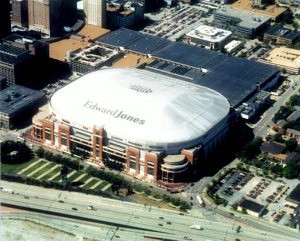 Jim Nagourney, who spent three decades negotiating stadium deals on behalf of government agencies and team owners, describes how he helped snooker city officials as a consultant to the Los Angeles Rams, who were then negotiating a move to a new stadium in St. Louis. “We had a whiteboard, and we’re putting stuff down” to demand in a stadium lease, he recalls. “I said, ‘Guys, some of this is crazy.’ And John Shaw, who was president of the Rams at the time—brilliant, brilliant guy—said, ‘They can always say no. Let’s ask for it.’” The result, which Nagourney calls “probably the most scandalous deal in the country,” included a clause requiring the new stadium to remain “state-of-the-art,” or else the team could break its lease and leave. “The city was poorly represented—the city is always poorly represented…. We put in all of these ridiculous things, and the city didn’t have the sense to say no to any of them.” – The Nation
Jim Nagourney, who spent three decades negotiating stadium deals on behalf of government agencies and team owners, describes how he helped snooker city officials as a consultant to the Los Angeles Rams, who were then negotiating a move to a new stadium in St. Louis. “We had a whiteboard, and we’re putting stuff down” to demand in a stadium lease, he recalls. “I said, ‘Guys, some of this is crazy.’ And John Shaw, who was president of the Rams at the time—brilliant, brilliant guy—said, ‘They can always say no. Let’s ask for it.’” The result, which Nagourney calls “probably the most scandalous deal in the country,” included a clause requiring the new stadium to remain “state-of-the-art,” or else the team could break its lease and leave. “The city was poorly represented—the city is always poorly represented…. We put in all of these ridiculous things, and the city didn’t have the sense to say no to any of them.” – The Nation
That's just ugly. There couldn't be a much more searing condemnation of the process that saw St. Louis commit many millions of dollars to lure an NFL team. The Rams moving to St. Louis is often cited as a point of civic pride (or the healing of a civic bruise). We're a big city because we have the NFL, people say. Of course there's zero evidence that any professional sports franchise provides a city a net financial gain. The above quote is from a story in The Nation titled, "Why Do Mayors Love Sports Stadiums?", which looks at the increasingly expensive, and creative, deals to build stadiums.
The Rams giveaway and the challenge of an urban football stadium have been written about here previously. St. Louis doesn't have the worst stadium deal in the nation. That's Cincinnati far and away. But the lease from the 1990's has an escape hatch for Ram's owner Stan Kronke. The "state-of-the-art" clause has been ignored once and may be reconsidered this time around as well. But St. Louis doesn't have the capability to finance substantial renovations to the dome. The last renovations were paid for refinancing debt. That's not happening again.
Of course whether or not the Rams stay, the City of St. Louis, St. Louis County and the State of Missouri will continue to pay for the dome, a total of $24M each year and a total payout of $720M over 30 years. Even a team that stays, often piles a heavy debt on their city. Indianapolis is on the hook for $61M of remaining RCA Dome debt, which will take until 2021 to pay off, while they now subsidize Lucas Oil Stadium. The RCA Dome stood for just 24 years.
So it appears rather, let's say, impossible, that the Rams will get a new stadium in St. Louis. As Ray Hartmann wrote in a recent St. Louis Magazine piece, the decision regarding whether the Rams stay or go will be made in LA (and this aspect of the issue isn't being covered by the St. Louis press). With a new billion-dollar stadium and other incentives, why wouldn't the Rams move? According to Forbes, the St. Louis franchise is the 30th most valuable in the NFL. Who thinks that wouldn't change with a move to LA?
I love watching football and think it's great that St. Louis has a team, but I care more for the economic health of the region. We simply gave away too much to bring the Rams to town. Whatever happens, let's hope that a new and different group of civic leadership emerges to negotiate the future of the franchise, or at least that the old one is no longer listened to. Again, the saving grace is likely that the decision doesn't rest of what St. Louis or Missouri do, but on what the effort in LA wants.
The dome lease in St. Louis is nearing the first of many deadlines of back and forth between the Rams and area officials. Presumably each hurdle will be followed and reported, but St. Louis should gain a backbone and understand that Kroenke's leaving or he's not. No scheme, such as giving the defunct Bottle Works site to the Rams will tip the balance. And if he's staying, the city, county and state should avoid another decade's long, multi-million dollar giveaway. Given our history, there's little hope we'll avoid such civic "leadership", but with our coffers empty, perhaps there's hope.


